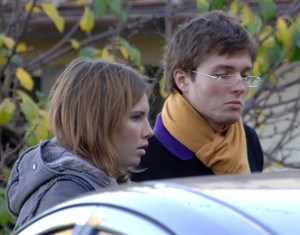
FILE - This Nov. 2, 2007 file photo shows American exchange student Amanda Knox, left, and her Italian boyfriend Raffaele Sollecito outside the rented house where 21-year-old British student Meredith Kercher was found dead in Perugia, Italy. Knox spent four years in jail in Italy, from her arrest to her conviction in her first murder trial through her successful appeal. She’s now facing a second appeals trial, along with Sollecito. (AP Photo/Stefano Medici, File)
December 16, 2013 - 8:13 AM
FLORENCE, Italy - A lawyer urged an Italian appeals court on Monday to convict Amanda Knox of murdering British student Meredith Kercher and denounced how the American was soliciting donations in Kercher's memory.
Francesco Maresca, in his closing arguments in the third trial of Knox and co-defendant Raffaele Sollecito, urged the panel of two professional judges and eight lay jurors to disregard Knox's claims of innocence and her criticism of Italy's judicial system as "failed, or fallible."
"She has become a well-known person. You know she signed contracts for millions of dollars for her book. She has someone who takes care of her public relations. She has a personal website where she invites people to collect donations in the memory of the victim, Meredith Kercher, which is an unbearable contradiction for the family," Maresca said.
He said the world's attention has focused on Knox, while "the victim has fallen into total oblivion, to the immense pain of the Kercher family."
Knox is soliciting donations on her website for her defence as well as a separate, as yet-unspecified project in Kercher's memory.
Maresca also urged the court to disregard Sollecito's statement to the court last month professing his innocence, noting that he had "just returned from a vacation in Santo Domingo, where he is again in these days, as we are here hearing such an important trial against him."
Kercher, 21, was brutally murdered in November 2007 in the apartment she shared with Knox in the picturesque university town of Perugia. She had been raped and her throat slashed, her body left beneath a blanket in her bedroom. Prosecutors claim Knox and Sollecito carried out the murder with a third man, Ivory Coast-born Rudy Guede, who is serving a 16-year sentence.
The case was being tried for a third time after Italy's highest court vacated a 2011 appellate court ruling throwing out their initial murder convictions. The high court's scathing opinion tore apart the appellate court's decision to free the pair as full of errors and contradictions.
Knox, now 26, spent four years in prison until she was freed in 2011 and returned to the United States, where she remains. Sollecito, 29, has attended several hearings of the current appeal. Defendants in Italy are not required to attend trials.
Maresca urged the Florence appeals court to find Knox and Sollecito guilty of Kercher's murder, backing the state prosecutor's demands for sentences of 26 years for the murder and a four-year sentence for Knox for slander — up from the three years already confirmed by Italy's highest court.
He called the ruling overturning the convictions "science fiction," particularly when it came to undermining DNA evidence that was critical to the initial convictions. He said the first court's finding that Kercher's DNA was on the presumed murder weapon stands, that that there was no contamination of DNA attributed to Sollecito on Kercher's bra clip.
Maresca identified two pivotal arguments in the case against Knox and Sollecito: Knox's false accusation against a Congo-born bar owner and a staged robbery, both of which Maresca said were aimed at sidetracking the investigation.
The Kercher family's legal team argued that the killing could not have been carried out only by Guede, reminding the court that Italy's highest court ruled that he had not acted alone.
Maresca also argued that it would not have been possible for one person to inflict the kind of wounds that Kercher suffered: 43 in all, including three "devastating" cuts to the neck.
The other wounds were aimed at threatening the British student, and were found on her face, eyes, mouth, gums and teeth. He argued that two knives were used, the kitchen knife found at Sollecito's apartment that is the presumed to be the murder weapon, and a smaller knife.
At the same time, Kercher had no defensive wounds, said Kercher family lawyer Serena Perna, indicating that someone held her back.
No one from Kercher's family travelled to Italy for the closing arguments, but Maresca said her sister and maybe a brother would come for the verdict, expected in January.
News from © The Associated Press, 2013